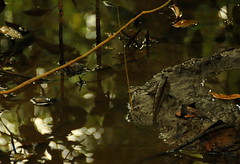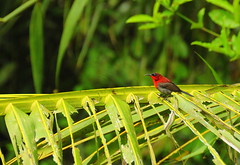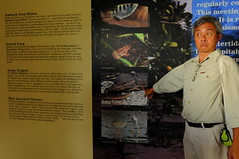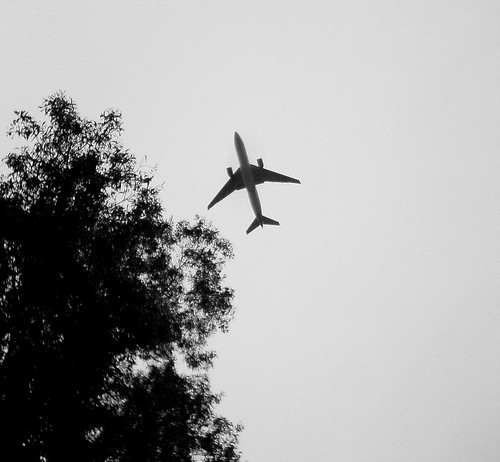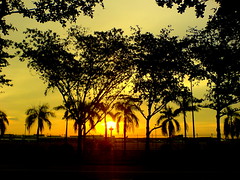Boating, Transversing Park Connectors and What We Talk About When We Talk About Prayer (Colossians 4:2-4)
A pant-astic Saturday is:
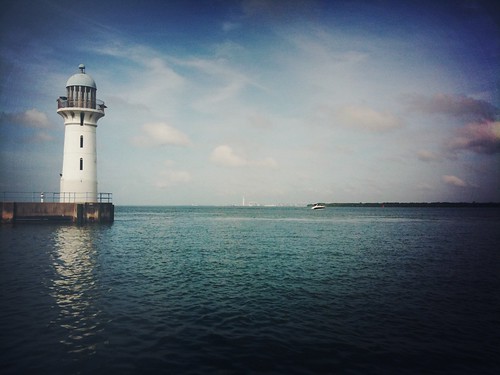
being out in the waters off Raffles Marina, waving to coast guards and getting the power boat driving sorted (and also having the Dynaglass gorge out a bit of flesh from the shin),
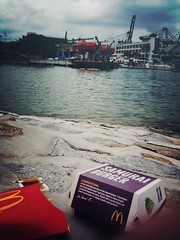
sitting on the breakers, chowing down a McDonald's Samurai burger meal while watching the test launches from the Singapore Poly Marina and commentating obnoxiously on the same (the obnoxiousness is intensified if one of you has a strong American drawl that carries across water),

getting a Flying Pigeon from the old Tong Ah & Co bicycle shop,
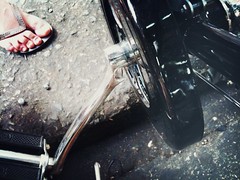
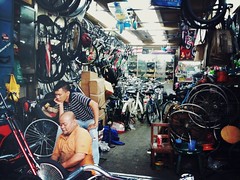
only to have the right crankarm shear off from the crankset about an hour later, being rescued by an uncle who laughed at the assumption of a return policy or warranty of any sort, nodded his tight perm, stroked his small moustache with uncle-bling-ladden hand, directed me to Teck Bee Brothers on Syed Alwi for a fix, took me along backroads of Jalan Besar and Lavender to Kallang River where he offered his number, expressed fear for my safety, then left to continue his attempt to clear his head from last night's binge-drinking,
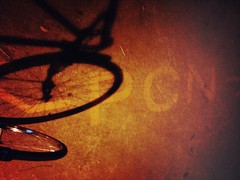
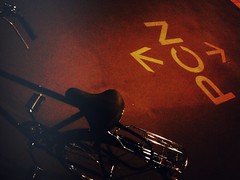
riding the Kallang, Ang Mo Kio and Buangkok Park Connectors till it was too dark to see anything. (National Parks' more useful maps from 2009 are here: Kallang Park Connector, Ang Mo Kio Park Connector.)
A few photos from the trip:
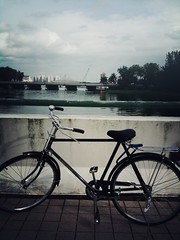
the bridge linking Lavender Street to Kampong Bugis across Sungei Rochor,


pitstop at Loysel's Toy at Kallang Bahru for flat white, croissant and water, where a light drizzle made some very nice strangers offer brollies to keep forever,
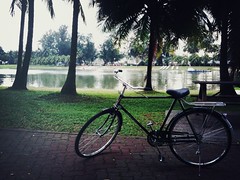
through Kallang Riverside Park, past the huffing dragonboaters, to cross Sir Arthur's bridge to use the underpass on the other side,
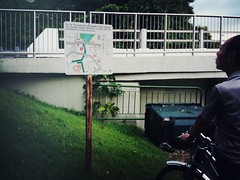
dismounted and pushed bike along the edge of Geylang Lorong 1 Bus Terminal towards Kallang MRT and connected to the disconnected Kallang Park Connector across Sims Avenue,
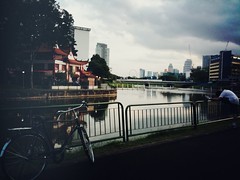
swept past Chwee Kang Beo temple, crossed a bridge and paused to enjoy the view of the Singapore Flyer,
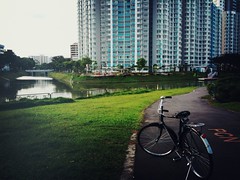
marvelled at the loveliness of staying in a HDB flat at The River Vista @ Kallang,
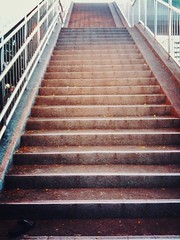
carried the 20kg dead weight of F Pigeon up the overhead bridge across the very busy Bendemeer Road,
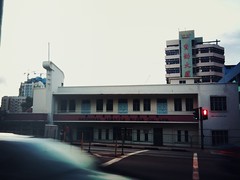
National Aerated Water Co. Ltd. - Kickapoo in glass bottles no more,
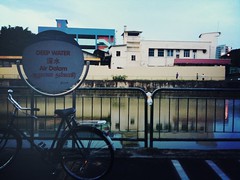
on the opposite bank of the Kallang River from National Aerated Water Co. Ltd. building where people were chatting and fishing,
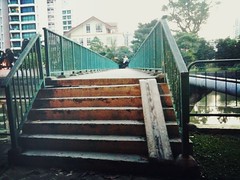
crossed back over the Kallang River - this bridge had helpful grooves for bicycle wheels,
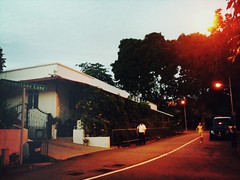
turned right through a little grove and then left onto Moonstone Lane, headed uphill and turned right towards Topaz Road while being amused by the gemstone road names (in the vicinity, "Ruby Lane" and "Opal Crescent"),
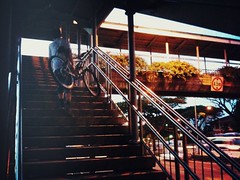
not so amused to be confronted with the mother of overhead bridges across the Pan-Island Expressway (PIE) to St. Andrew's Village, carted the 20kg dead weight across again, (at which point I wished I could, just like one toggles a weapon-change in RPGs, toggle my ride to the 10kg Strida...)
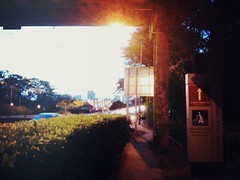
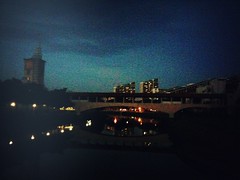
pushed F Pigeon along a narrow path along the walls of the peach-pink Anglican Diocesan Centre, across another bridge where the view of the St. Andrew's bridge was lovely,
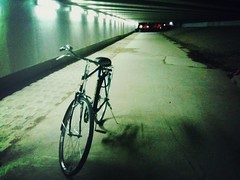
from then it was smooth cycling along the feeder into Kallang River with the charmingly un-upgraded Potong Pasir to my right, until I had to dismount and push F. Pigeon through the underpass under the Central Expressway (CTE) or risk a S$1,000 fine,
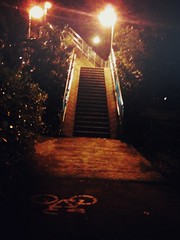
past the SBS Transit headquarters and ComfortDelgro Engineering, we were confronted with yet another overhead bridge across Braddell Road, this one fortunately with bicycle wheel grooves for the Fat Princess,
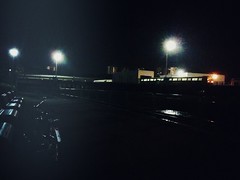
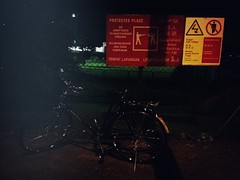
another smooth ride along Sungei Kallang SMRT Train Depot to the right, which seemed to promise that trespassers would be electrocuted then shot,
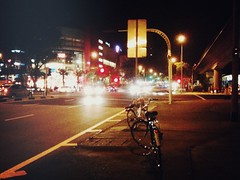
skirted the edge of Bishan next to the artificial river that was being constructed to run through Bishan Park and turned right to the Ang Mo Kio Park Connector to Ang Mo Kio Town Garden West and crossed the road, pushed bike through the extremely busy Ang Mo Kio central to AMK Hub,
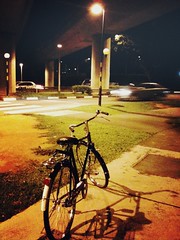
moved up along Ang Mo Kio Avenue 8 under the MRT track and right onto Ang Mo Kio Avenue 5 to join the Buangkok? Park Connector towards Punggol Park, past Nanyang Polytechnic on the left, back under the CTE again, and Ang Mo Kio Industrial Park on the right.
Then we headed for dinner and bed. Adventures of F. Pigeon to be continued another day.
Just as references to rivers in Singapore's total defence classic This Is Home would be taken by most residents as metaphor ("alas unexplored blue spaces" say the URA planners), so prayer might be taken by many Christians as imagery and ideal rather than daily reality.
John Woodhouse's discerning application of Colossians 4 is well worth a think:
There are a small number of subjects that a preacher or Bible teacher can touch on, and be almost certain to stir the conscience of at least many of his Christian hearers. All but the most insensitive of us find certain topics awkward, threatening and guilt-arousing. This is partly because all of us have secrets. What we are, what we think, what we have done are things only partly known to those who know us, even those who know us well. How could it be otherwise? Among the hidden things abotu us there are things we really are glad are hidden (and we would like to remain hidden forever, even from ourselves, if that were possible). The word for how we feel about these things is "ashamed". When a preacher or Bible teacher starts to talk about one of these things, we cringe inside. Those of us whose consciences are sensitive can be troubled, not only about the matter of which we have been reminded, but by the very fact that it is secret: that our life is at this point a pretence. If you are a serious Christian person, you may be troubled, not only by your sense of guilt or shame, but also by your sense of hypocrisy. I am quite sure that most readers of this book know exactly what I am talking about.
...Whenever I speak about prayer, I know that if my hearers are Christian, then their consciences will be easily provoked.
...As the letter draws to a close, he speaks of prayer:
As this great man of prayer spoke of his own praying at the beginning of this letter, he now addresses his readers about their praying as the letter draws to a close.
Reading Paul's words, it is difficult for our minds not to turn to our secret failures in praying - how inadequate we feel as pray-ers - how little time and effort we give to prayer - how easily it is the first thing dropped from our daily activities - and so we could go on. Many Christians feel ashamed, even guilty, about their prayerlessness.
However, I want to suggest that God's Word does not work like that. Certainly here Paul is not playing on the sensitive consciences and guilt feelings of believers who do not pray as much or as diligently as they think they should.
(Preachers and Bible teachers take note. It is easy to achieve certain responses through playing on tender emotions in the hearers. There are various techniques, that come with just a little experience in public speaking, to manipulate the feelings of listeners. This is a significant temptation to the preacher, for the Word of God does deal with many sensitive subjects. It is ever so easy to stir up memories you know many of your hearers have (because you have them too!), to touch raw nerves you know so well (because they are raw for you too!). But is this the work of the Spirit of God? Is this what God's Word in fact does with these sensitive subjects? I am not suggesting that the Word of God does not search consciences, nor that shame and guilt are things we should ignore, deny or run away from. The Spirit of God does stir our emotions and our consciences by his Word. I am simply saying that the preacher's task is to ensure that God's Word does God's work rather than manipulative speaking doing the preacher's work. Faithful exposition of the Word of God allows Scripture to set the agenda, and this take great care. As a general principle, we should understand that the Word of God has not done its work if the hearer is left simply feeling terrible, or just determined to try harder in the future.)
The way in which Paul speaks to his readers about prayer is particularly striking.
A call to pray (Colossians 4:2)
The first thing we should notice is that 4:2 is certainly a call to pray - a serious call to pray. Indeed it is a call to follow the example of Paul himself, as we heard of his praying at the beginning of the letter.
The power of this call to prayer, however, comes from its context in the letter as a whole, not just from the words here in 4:2, heard as an isolated rule or command. Like all that we have heard through chapter 3 of the letter, the call to pray comes as a part of an exposition of the life of faith in Christ Jesus. Paul's theme is:"As you received Christ Jesus the Lord, so walk in him, rooted and built up in him and established in the faith, just as you were taught, abounding in thanksgiving (2:6,7). That will mean praying.
Why? The answer to the questions is: For the same reason that Paul himself had not ceased praying for the believers in Colossae from the day he heard about them (1:9). It is because something absolutely wonderful and extraordinary is going on. Our Lord Jesus Christ is the one through whom on and for whom all things have been made, and by his death on the cross God has reconciled all things to him (1:15-20). Through Christ, God is bringing the universe back together again: order out of chaos, peace out of hostility (2:15), reconciliation out of alienation (1:20). Christ among the nations is the hope of glory (1:27)!
This is why Paul prayed, "asking that you may be filled with the knowledge of his will in all spiritual wisdom and understanding, so as to walk in a manner worthy of the Lord, fully pleasing him, bearing fruit in every good work and increasing in the knowledge of God" (1:9,10). Paul prayed, not simply as a spiritual exercise or discipline, and certainly not in order to move an inactive God into action. Paul prayed because of the extraordinary work that God had done and that God was doing.
Yet it is even more than that. The call to pray in 4:2 comes to us because through faith in the Lord Jesus Christ, God is turning chaos to order, hostility to peace, alienation to reconciliation in our lives (1:21,22; 2:5). Praying is a characteristic of the reordered life. The new life in union with Christ in his death and resurrection has been the subject since 3:1. This life (see 3:12-17) is a stark contrast to the chaos (see 3:5-8). Prayer and peace with God go together. God's enemies do not pray. The reconciled pray; the alienated do not.
In other words, if we have been listening to the teaching in this letter, we will not hear the call to pray in 4:2 as an obligation that condemns and threatens and rouses the sense of guilt but as a gospel invitation. Listen to the particular way in which the call is expressed.
"Continue steadfastly"
"Continue steadfastly in prayer", says the apostle. Other English translations have "Devote yourselves to prayer" (TNIV). Similar expressions are found a number of times in the New Testament. It is what the apostles did in Acts 6:4: they devoted themselves to prayer and the ministry of the word. The three thousand who received the word on the day of Pentecost devoted themselves to the apostles' teaching and fellowship, to the breaking of bread and the prayers (Acts 2:42). Indeed it is what Jesus' disciples were doing immediately after his ascension as they waited in Jerusalem: they were devoting themselves to prayer (Acts 1:14).
Paul certainly calls for a commitment to praying. There is also a sense of privilege. When you know and understand the grace of God in Jesus Christ, praying is what you do. When we are conscious of what God has done and is doing and will do, we will pray. This is precisely what we heard Paul doing at the beginning of the letter. "We always thank God, the Father of our Lord Jesus Christ, when we pray for you, since we heard of your faith in Christ Jesus and of the love that you have for all the saints...And so, from the day we heard, we have not ceased to pray for you, asking that you may be filled with the knowledge of his will..." (1:3,9). Now he invites his readers to do likewise: continue steadfastly in prayer. Devote yourselves to prayer.
"Being watchful"
What will enable us to heed this call? It requires being watchful in it. Being awake. Praying is not the sleepy activity we may sometimes imagine (and perhaps sometimes practise!). It requires alertness. Yet this is not simply a call not to drift off to sleep as we pray, as the disciples did in the Garden of Gethsemane (Mark 14:37). As on that occasion, praying requires being awake to what is really happening. Don't lose sight of the fact that you have been raised with Christ (3:1), that you have died and your life is hidden with Christ in God (3:3). Keep awake to what is soon to happen. When Christ who is your life appears, then you also will appear with him in glory (3:4).
This characteristic of the Christian life is worth emphasising. Jesus taught it:"Therefore stay awake - for you do not know when the master of the house will come, in the evening, or at midnight, or when the rooster crows, or in the morning - lest he come suddenly and find you asleep. And what I say to you I say to all: Stay awake" (Mark 13:35-37); "Therefore, stay awake, for you do not know on what day your Lord is coming" (Matthew 24:42); "Watch and pray that you may not enter into temptation" (Matthew 26:41).
This wakeful watchfulness is alertness to the realities to which "you have heard in... the gospel" (cf 1:5). It is keeping our eyes of faith open. It is having the work of God in Christ and in his gospel in our consciousness. When we see life and the world in this brilliant light, when we understand what is going on, then we can properly hear this call to pray.
With thanksgiving
The third element in the call to pray in 4:2 settles the fact that this call is not intended to be guilt-driven. On the contrary, we are to pray with thanksgiving. Being watchful is not a matter of being frightened, worried, or anxious. On the contrary, like the whole Christian life, praying is energised by thankfulness.
This has been a repeated note through this letter, which has been described as "one of the most thankful documents in the New Testament". It began with Paul's own "We always thank God...since we heard of your faith in Christ Jesus" (1:3,4). Then his prayer for the Colossian believers climaxed with the request that they would be "giving thanks to the Father, who has qualified you to share in the inheritance of the saints in light" (1:12). Indeed the purpose of this letter includes that its readers will "abound in thanksgiving" (2:7). At one point in this letter, Paul simply and starkly says,"And be thankful" (3:15), and then speaks of the "thankfulness in your hearts to God" (3:16). Indeed the Christian life can be summed up as "whatever you do, in word or deed, do everything in the name of the Lord Jesus, giving thanks to God the Father through him" (3:17).
The words of 4:2 should move us to be serious about praying, but if we hear these words rightly we will be moved, not by guilt feelings, but by being "woken up" and by thankfulness.

being out in the waters off Raffles Marina, waving to coast guards and getting the power boat driving sorted (and also having the Dynaglass gorge out a bit of flesh from the shin),

sitting on the breakers, chowing down a McDonald's Samurai burger meal while watching the test launches from the Singapore Poly Marina and commentating obnoxiously on the same (the obnoxiousness is intensified if one of you has a strong American drawl that carries across water),

getting a Flying Pigeon from the old Tong Ah & Co bicycle shop,


only to have the right crankarm shear off from the crankset about an hour later, being rescued by an uncle who laughed at the assumption of a return policy or warranty of any sort, nodded his tight perm, stroked his small moustache with uncle-bling-ladden hand, directed me to Teck Bee Brothers on Syed Alwi for a fix, took me along backroads of Jalan Besar and Lavender to Kallang River where he offered his number, expressed fear for my safety, then left to continue his attempt to clear his head from last night's binge-drinking,


riding the Kallang, Ang Mo Kio and Buangkok Park Connectors till it was too dark to see anything. (National Parks' more useful maps from 2009 are here: Kallang Park Connector, Ang Mo Kio Park Connector.)
A few photos from the trip:

the bridge linking Lavender Street to Kampong Bugis across Sungei Rochor,


pitstop at Loysel's Toy at Kallang Bahru for flat white, croissant and water, where a light drizzle made some very nice strangers offer brollies to keep forever,

through Kallang Riverside Park, past the huffing dragonboaters, to cross Sir Arthur's bridge to use the underpass on the other side,

dismounted and pushed bike along the edge of Geylang Lorong 1 Bus Terminal towards Kallang MRT and connected to the disconnected Kallang Park Connector across Sims Avenue,

swept past Chwee Kang Beo temple, crossed a bridge and paused to enjoy the view of the Singapore Flyer,

marvelled at the loveliness of staying in a HDB flat at The River Vista @ Kallang,

carried the 20kg dead weight of F Pigeon up the overhead bridge across the very busy Bendemeer Road,

National Aerated Water Co. Ltd. - Kickapoo in glass bottles no more,

on the opposite bank of the Kallang River from National Aerated Water Co. Ltd. building where people were chatting and fishing,

crossed back over the Kallang River - this bridge had helpful grooves for bicycle wheels,

turned right through a little grove and then left onto Moonstone Lane, headed uphill and turned right towards Topaz Road while being amused by the gemstone road names (in the vicinity, "Ruby Lane" and "Opal Crescent"),

not so amused to be confronted with the mother of overhead bridges across the Pan-Island Expressway (PIE) to St. Andrew's Village, carted the 20kg dead weight across again, (at which point I wished I could, just like one toggles a weapon-change in RPGs, toggle my ride to the 10kg Strida...)


pushed F Pigeon along a narrow path along the walls of the peach-pink Anglican Diocesan Centre, across another bridge where the view of the St. Andrew's bridge was lovely,

from then it was smooth cycling along the feeder into Kallang River with the charmingly un-upgraded Potong Pasir to my right, until I had to dismount and push F. Pigeon through the underpass under the Central Expressway (CTE) or risk a S$1,000 fine,

past the SBS Transit headquarters and ComfortDelgro Engineering, we were confronted with yet another overhead bridge across Braddell Road, this one fortunately with bicycle wheel grooves for the Fat Princess,


another smooth ride along Sungei Kallang SMRT Train Depot to the right, which seemed to promise that trespassers would be electrocuted then shot,

skirted the edge of Bishan next to the artificial river that was being constructed to run through Bishan Park and turned right to the Ang Mo Kio Park Connector to Ang Mo Kio Town Garden West and crossed the road, pushed bike through the extremely busy Ang Mo Kio central to AMK Hub,

moved up along Ang Mo Kio Avenue 8 under the MRT track and right onto Ang Mo Kio Avenue 5 to join the Buangkok? Park Connector towards Punggol Park, past Nanyang Polytechnic on the left, back under the CTE again, and Ang Mo Kio Industrial Park on the right.
Then we headed for dinner and bed. Adventures of F. Pigeon to be continued another day.
Just as references to rivers in Singapore's total defence classic This Is Home would be taken by most residents as metaphor ("alas unexplored blue spaces" say the URA planners), so prayer might be taken by many Christians as imagery and ideal rather than daily reality.
John Woodhouse's discerning application of Colossians 4 is well worth a think:
Moore College - John Woodhouse - Colossians 4:2-4 from Audio Advice
There are a small number of subjects that a preacher or Bible teacher can touch on, and be almost certain to stir the conscience of at least many of his Christian hearers. All but the most insensitive of us find certain topics awkward, threatening and guilt-arousing. This is partly because all of us have secrets. What we are, what we think, what we have done are things only partly known to those who know us, even those who know us well. How could it be otherwise? Among the hidden things abotu us there are things we really are glad are hidden (and we would like to remain hidden forever, even from ourselves, if that were possible). The word for how we feel about these things is "ashamed". When a preacher or Bible teacher starts to talk about one of these things, we cringe inside. Those of us whose consciences are sensitive can be troubled, not only about the matter of which we have been reminded, but by the very fact that it is secret: that our life is at this point a pretence. If you are a serious Christian person, you may be troubled, not only by your sense of guilt or shame, but also by your sense of hypocrisy. I am quite sure that most readers of this book know exactly what I am talking about.
...Whenever I speak about prayer, I know that if my hearers are Christian, then their consciences will be easily provoked.
...As the letter draws to a close, he speaks of prayer:
Continue steadfastly in prayer, being watchful in it with thanksgiving. At the same time, pray also for us, that God may open to us a door for the word, to declare the mystery of Christ, on account of which I am in prison - that I may make it clear, which is how I ought to speak (Colossians 4:24)All the evidence suggests that Paul was a remarkable pray-er. At the beginning of this letter he spoke naturally about "when we pray for you" (1:3), and it is clear that this was not an occasional thing: "from the day we heard [of your faith, love and hope in Christ Jesus], we have not ceased to pray for you" (1:9). When you consider that Paul said something quite similar in letters to Christians in Rome (Romans 1:9,10), Ephesus (Ephesians 1:16), Philippi (Philippians 1:3,9) and Thessalonica (1 Thessalonians 1:2), as well as in his letters to Timothy (2 Timothy 1:3) and Philemon (Philemon 4), we can see that praying is something he took very seriously indeed. It must have taken a considerable amount of his time.
As this great man of prayer spoke of his own praying at the beginning of this letter, he now addresses his readers about their praying as the letter draws to a close.
Reading Paul's words, it is difficult for our minds not to turn to our secret failures in praying - how inadequate we feel as pray-ers - how little time and effort we give to prayer - how easily it is the first thing dropped from our daily activities - and so we could go on. Many Christians feel ashamed, even guilty, about their prayerlessness.
However, I want to suggest that God's Word does not work like that. Certainly here Paul is not playing on the sensitive consciences and guilt feelings of believers who do not pray as much or as diligently as they think they should.
(Preachers and Bible teachers take note. It is easy to achieve certain responses through playing on tender emotions in the hearers. There are various techniques, that come with just a little experience in public speaking, to manipulate the feelings of listeners. This is a significant temptation to the preacher, for the Word of God does deal with many sensitive subjects. It is ever so easy to stir up memories you know many of your hearers have (because you have them too!), to touch raw nerves you know so well (because they are raw for you too!). But is this the work of the Spirit of God? Is this what God's Word in fact does with these sensitive subjects? I am not suggesting that the Word of God does not search consciences, nor that shame and guilt are things we should ignore, deny or run away from. The Spirit of God does stir our emotions and our consciences by his Word. I am simply saying that the preacher's task is to ensure that God's Word does God's work rather than manipulative speaking doing the preacher's work. Faithful exposition of the Word of God allows Scripture to set the agenda, and this take great care. As a general principle, we should understand that the Word of God has not done its work if the hearer is left simply feeling terrible, or just determined to try harder in the future.)
The way in which Paul speaks to his readers about prayer is particularly striking.
A call to pray (Colossians 4:2)
The first thing we should notice is that 4:2 is certainly a call to pray - a serious call to pray. Indeed it is a call to follow the example of Paul himself, as we heard of his praying at the beginning of the letter.
The power of this call to prayer, however, comes from its context in the letter as a whole, not just from the words here in 4:2, heard as an isolated rule or command. Like all that we have heard through chapter 3 of the letter, the call to pray comes as a part of an exposition of the life of faith in Christ Jesus. Paul's theme is:"As you received Christ Jesus the Lord, so walk in him, rooted and built up in him and established in the faith, just as you were taught, abounding in thanksgiving (2:6,7). That will mean praying.
Why? The answer to the questions is: For the same reason that Paul himself had not ceased praying for the believers in Colossae from the day he heard about them (1:9). It is because something absolutely wonderful and extraordinary is going on. Our Lord Jesus Christ is the one through whom on and for whom all things have been made, and by his death on the cross God has reconciled all things to him (1:15-20). Through Christ, God is bringing the universe back together again: order out of chaos, peace out of hostility (2:15), reconciliation out of alienation (1:20). Christ among the nations is the hope of glory (1:27)!
This is why Paul prayed, "asking that you may be filled with the knowledge of his will in all spiritual wisdom and understanding, so as to walk in a manner worthy of the Lord, fully pleasing him, bearing fruit in every good work and increasing in the knowledge of God" (1:9,10). Paul prayed, not simply as a spiritual exercise or discipline, and certainly not in order to move an inactive God into action. Paul prayed because of the extraordinary work that God had done and that God was doing.
Yet it is even more than that. The call to pray in 4:2 comes to us because through faith in the Lord Jesus Christ, God is turning chaos to order, hostility to peace, alienation to reconciliation in our lives (1:21,22; 2:5). Praying is a characteristic of the reordered life. The new life in union with Christ in his death and resurrection has been the subject since 3:1. This life (see 3:12-17) is a stark contrast to the chaos (see 3:5-8). Prayer and peace with God go together. God's enemies do not pray. The reconciled pray; the alienated do not.
In other words, if we have been listening to the teaching in this letter, we will not hear the call to pray in 4:2 as an obligation that condemns and threatens and rouses the sense of guilt but as a gospel invitation. Listen to the particular way in which the call is expressed.
"Continue steadfastly"
"Continue steadfastly in prayer", says the apostle. Other English translations have "Devote yourselves to prayer" (TNIV). Similar expressions are found a number of times in the New Testament. It is what the apostles did in Acts 6:4: they devoted themselves to prayer and the ministry of the word. The three thousand who received the word on the day of Pentecost devoted themselves to the apostles' teaching and fellowship, to the breaking of bread and the prayers (Acts 2:42). Indeed it is what Jesus' disciples were doing immediately after his ascension as they waited in Jerusalem: they were devoting themselves to prayer (Acts 1:14).
Paul certainly calls for a commitment to praying. There is also a sense of privilege. When you know and understand the grace of God in Jesus Christ, praying is what you do. When we are conscious of what God has done and is doing and will do, we will pray. This is precisely what we heard Paul doing at the beginning of the letter. "We always thank God, the Father of our Lord Jesus Christ, when we pray for you, since we heard of your faith in Christ Jesus and of the love that you have for all the saints...And so, from the day we heard, we have not ceased to pray for you, asking that you may be filled with the knowledge of his will..." (1:3,9). Now he invites his readers to do likewise: continue steadfastly in prayer. Devote yourselves to prayer.
"Being watchful"
What will enable us to heed this call? It requires being watchful in it. Being awake. Praying is not the sleepy activity we may sometimes imagine (and perhaps sometimes practise!). It requires alertness. Yet this is not simply a call not to drift off to sleep as we pray, as the disciples did in the Garden of Gethsemane (Mark 14:37). As on that occasion, praying requires being awake to what is really happening. Don't lose sight of the fact that you have been raised with Christ (3:1), that you have died and your life is hidden with Christ in God (3:3). Keep awake to what is soon to happen. When Christ who is your life appears, then you also will appear with him in glory (3:4).
This characteristic of the Christian life is worth emphasising. Jesus taught it:"Therefore stay awake - for you do not know when the master of the house will come, in the evening, or at midnight, or when the rooster crows, or in the morning - lest he come suddenly and find you asleep. And what I say to you I say to all: Stay awake" (Mark 13:35-37); "Therefore, stay awake, for you do not know on what day your Lord is coming" (Matthew 24:42); "Watch and pray that you may not enter into temptation" (Matthew 26:41).
This wakeful watchfulness is alertness to the realities to which "you have heard in... the gospel" (cf 1:5). It is keeping our eyes of faith open. It is having the work of God in Christ and in his gospel in our consciousness. When we see life and the world in this brilliant light, when we understand what is going on, then we can properly hear this call to pray.
With thanksgiving
The third element in the call to pray in 4:2 settles the fact that this call is not intended to be guilt-driven. On the contrary, we are to pray with thanksgiving. Being watchful is not a matter of being frightened, worried, or anxious. On the contrary, like the whole Christian life, praying is energised by thankfulness.
This has been a repeated note through this letter, which has been described as "one of the most thankful documents in the New Testament". It began with Paul's own "We always thank God...since we heard of your faith in Christ Jesus" (1:3,4). Then his prayer for the Colossian believers climaxed with the request that they would be "giving thanks to the Father, who has qualified you to share in the inheritance of the saints in light" (1:12). Indeed the purpose of this letter includes that its readers will "abound in thanksgiving" (2:7). At one point in this letter, Paul simply and starkly says,"And be thankful" (3:15), and then speaks of the "thankfulness in your hearts to God" (3:16). Indeed the Christian life can be summed up as "whatever you do, in word or deed, do everything in the name of the Lord Jesus, giving thanks to God the Father through him" (3:17).
The words of 4:2 should move us to be serious about praying, but if we hear these words rightly we will be moved, not by guilt feelings, but by being "woken up" and by thankfulness.
Labels: *Colossians, All Given For Food: Coffee, Amateur Sportiness: Bicycling/Biking/Cycling, Amateur Sportiness: Sailing and Boating, Prayer







